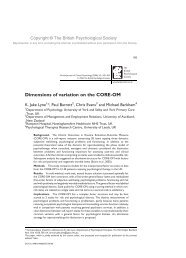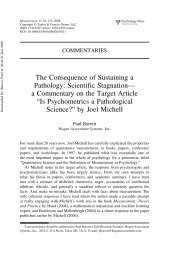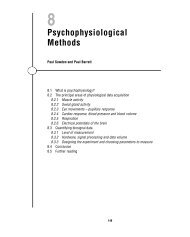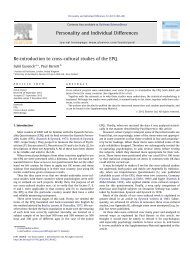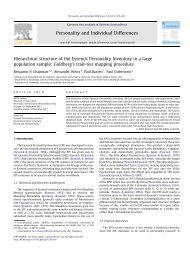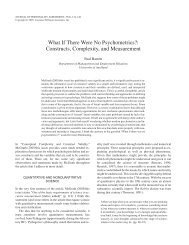Here - Paul Barrett
Here - Paul Barrett
Here - Paul Barrett
You also want an ePaper? Increase the reach of your titles
YUMPU automatically turns print PDFs into web optimized ePapers that Google loves.
Theories of Measurement Theories of MeasurementThe problem that faces management andorganizational behavior investigators is that thevariables which are of most interest to suchinvestigators are latent (unobservable,“intensive”, or “implicit”). That is, they do notexist as physical objects, entities, or material,which may be manipulated in order to determinethe empirical relations that may hold betweenamounts of them (e.g. like the length of woodenrods, or the weight of iron bars).For example, “Business-focused” variables suchas trust, integrity, job satisfaction, corporateculture, employee engagement, businessconfidence, managerial competencies, jobperformance, cultural climate etc. do not existphysically. Identification and use of suchvariables requires the processes of phenomenadetection and a theory constructed about whatthey are (or are considered to be), their cause,and subsequently their measurement orassessment.MGMT 740 – 849th March 2006 MGMT 740 – 850th March 2006Measurement TerminologyMeasurement Terminology Direct, Extensive, FundamentalMeasurement (a single variable). Extensivemeasurement is concerned with the discovery ofordering and concatenation relations on theobjects that directly reflect the quantitativestructure of the variable involved. Examples ofsuch extensively measured variables are: length,weight, duration (time), electrical resistance.Implicit, Intensive, Measurement: where thequantitative structure for a variable must beinferred from its relations between otherindependent variables via the conjointmeasurement axioms. An intensively measuredvariable is, by definition, a latent variable.MGMT 740 – 851th March 2006 MGMT 740 – 852th March 2006



